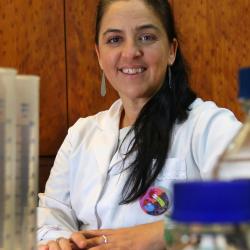
Amarelle Larrosa, María Vanesa
Research interests
Since 2003 I have been working in the Department of Microbial Biochemistry and Genomics at the Clemente Estable Institute for Biological Research. I am currently working on bacterial biotechnology, using Antarctic bacteria and functional metagenomics and synthetic microbiology approaches. My interest is designing biological alternatives to solve/respond to environmental problems.1- Antarctic microbiology. Although 80% of the biosphere (by volume) is permanently at temperatures below 4°C and most of the biomass is microbial, very little is known about the microorganisms that inhabit these environments. Antarctica is the coldest and driest continent, and is subject to extreme environmental conditions. Despite this, microorganisms have developed different physiological adaptations that allow them to thrive in these conditions. The study of Antarctic microorganisms is extremely interesting from the point of view of microbial physiology, ecology, their participation in biogeochemical cycles and their possible biotechnological application, among others. Since 2012, our group began the study of Antarctic bacteria, focusing mainly on the search for bacterial enzymes adapted to the environment with possible biotechnological application. We are currently interested in the study of bacteria capable of oxidizing manganese, which have various biotechnological applications: precipitation and removal of Mn(II), Fe(II) and As(III) in drinking water; degradation of compounds such as ciprofloxacin, and the cyanotoxin cylindrospermopsin; adsorption of heavy metals, among others.
2- Functional metagenomics as a bioprospecting tool. Metagenomics consists of the study/use of complete genomic information of a microbial population of a given habitat. It is based on the extraction of genomic DNA from the population (metagenomic DNA) and its use for the construction of metagenomic libraries in bacteria commonly used in the laboratory. The metagenomic libraries, where each clone contains a fragment of metagenomic DNA, can then be analyzed from a functional approach to search for and identify enzymes or new active compounds of technological, medical, agronomic, etc. interest. Our group focuses on the application of functional metagenomics for the prospecting of enzymes of biotechnological interest, and of biological parts with application in synthetic biology.
3- Synthetic microbiology. Synthetic biology is a young discipline with a great boom worldwide. It aims at the rational design of microorganisms through engineering principles applied to biology, in order to create, program and control cellular behavior for the development of microorganisms with different biotechnological applications. In our group we are generating new contributions to the field of synthetic biology, identifying and characterizing new biological parts and new bacterial models as biological chassis.
Personal information
ORCID: 0000-0003-0405-3321SCOPUS: 25822199200
CVUy: see
Institution: Instituto de Investigaciones Biológicas Clemente Estable
Career at PEDECIBA
Biology Area
As researcher
| Motive | Start date | Minutes | |
|---|---|---|---|
| Investigador - Ingreso | Grado 3 | 30/08/2017 | View minutes |
As student
| Motive | Education level | Start date | Minutes |
|---|---|---|---|
| Estudiante - Egreso | Doctorado | 21/09/2016 | View minutes |
| Estudiante - Ingreso | Doctorado | 06/10/2011 | View minutes |
| Estudiante - Desvinculación Adm. | Maestría | 06/10/2011 | View minutes |
| Estudiante - Ingreso | Maestría | 26/06/2008 | View minutes |